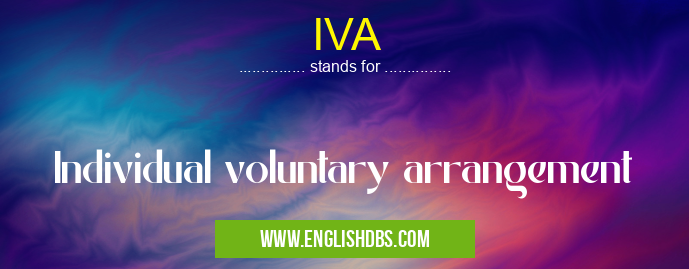What does IVA mean in LAW & LEGAL
Individual Voluntary Arrangement (IVA) is a formal and legally binding agreement between an insolvent individual and their creditors. It is a form of personal insolvency procedure designed to help individuals who cannot repay their debts in full to manage their financial situation and repay as much of their debts as possible over a period of time.

IVA meaning in Law & Legal in Governmental
IVA mostly used in an acronym Law & Legal in Category Governmental that means Individual voluntary arrangement
Shorthand: IVA,
Full Form: Individual voluntary arrangement
For more information of "Individual voluntary arrangement", see the section below.
IVA Meaning
IVA stands for Individual Voluntary Arrangement. It is a statutory procedure governed by the Insolvency Act 1986. An IVA is a legally binding agreement between an insolvent individual and their creditors, which sets out the terms for repaying debts over a period of time. The IVA is supervised by an Insolvency Practitioner (IP) who acts as a trustee for the creditors.
How does an IVA work?
An IVA is a formal insolvency procedure that is designed to help individuals who cannot repay their debts in full. It is a legal agreement between the individual and their creditors that sets out the terms for repaying debts over a period of time. The IVA is supervised by an Insolvency Practitioner (IP) who acts as a trustee for the creditors.
Benefits of an IVA
There are a number of benefits to entering into an IVA. These include:
- It can help to reduce the amount of debt that you owe
- It can stop creditors from taking legal action against you
- It can give you time to get your finances back on track
- It can improve your credit rating
Drawbacks of an IVA
There are also some drawbacks to entering into an IVA. These include:
- It can be expensive to set up and maintain
- It can take a long time to complete
- It can have a negative impact on your credit rating
Essential Questions and Answers on Individual voluntary arrangement in "GOVERNMENTAL»LAW"
What is an IVA?
An IVA is a type of formal insolvency procedure that allows individuals with unsecured debts to make a legally binding arrangement with their creditors to repay their debts over a period of time.
Who is eligible for an IVA?
Individuals can be eligible for an IVA if they meet certain criteria, including:
- Having unsecured debts of £6,000 or more
- Being unable to repay their debts in full
- Being employed or self-employed and earning a regular income
- Not having previously been bankrupt within the last 6 years.
What are the benefits of an IVA?
An IVA can offer several benefits, including:
- Stopping creditors from taking further action against you
- Freezing interest and charges on your debts
- Giving you time to repay your debts over a manageable period
- Protecting your assets from repossession or sale.
What are the disadvantages of an IVA?
There are some potential disadvantages to an IVA, including:
- It can take 5-6 years to complete
- You may have to make regular payments to your creditors
- Your credit rating will be affected
- You may have to sell some of your assets to repay your debts.
How do I apply for an IVA?
To apply for an IVA, you will need to contact an insolvency practitioner. They will assess your financial situation and advise you on whether an IVA is the right solution for you.
Final Words: An IVA is a complex and legally binding agreement. It is important to seek professional advice before entering into an IVA to ensure that it is the right option for you.
IVA also stands for: |
|
| All stands for IVA |
